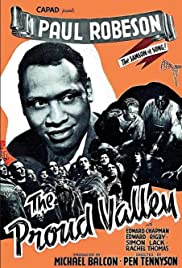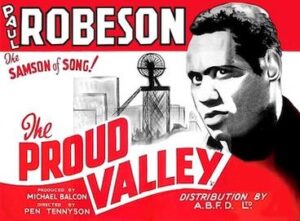The Proud Valley **** (1940, Paul Robeson, Edward Chapman, Simon Lack) – Classic Movie Review 11,201
Director Pen Tennyson’s 1940 Ealing Studios black and white drama The Proud Valley stars Paul Robeson, Edward Chapman and Edward Rigby.
In a Welsh coal mining valley, Welsh choir-leading coal miner Dick Parry (Edward Chapman) gets David Goliath (Paul Robeson), a young singing African-American seaman with a beautiful singing voice, a pit job as a miner to work along with him and his eldest son Emlyn (Simon Lack). Parry dies in a pit disaster, but David helps the mining community to recover its morale, and the pitmen themselves reopen their mine.
What may look like a minor wartime British flag-waver and message drama now was thought quite a big deal in its day. Its Welsh village setting is carefully sketched and its good intentions are very obviously worn on its sleeve, and its significance still shines through, but it all seems far too sentimental and shaky now.
However, Robeson appears at his charismatic best, easily carrying the film and its simple heartfelt messages. He delivers such songs as ‘Deep River’ and pieces from Handel’s Elijah with great emotion, and ends up dominating a film that seems too small for him in every way. The climactic ‘Right to Work’ march will bring a lump in the throat to all but the most cynical viewer. Rachel Thomas gives her first and best performance as Mrs Parry.
Also in the cast are Simon Lack, Janet Johnson, Charles Williams, Clifford Evans, Allan Jeayes, Jack Jones, George Merritt, Edward Lexy, Dilys Davies, Noel Howlett, Roddy Hughes, John Glyn-Jones, Ronald Ward, Harry Terry, Ben Williams, and Leslie Phillips.
On 10 July 1941, the talented 28-year-old director Tennyson (great-grandson of the Poet Laureate) died in Fleet Air Arm war action. He directed only three films: There Ain’t No Justice, The Proud Valley and Convoy.
The Proud Valley is directed by Pen Tennyson, runs 76 minutes, is made by Ealing Studios and CAPAD, is released by Associated British Film Distributors (1940) (UK) and Supreme Distributing Company (1941) (US), is written by Pen Tennyson (screenplay), Louis Golding (screenplay), Jack Jones (screenplay) and Roland Pertwee (uncredited), is shot in black and white by Roy Kellino and Glen MacWilliams, is produced by Michael Balcon (producer) and Sergei Nolbandov (associate producer), and scored by Ernest Irving (composer: additional music), with Art Direction by Wilfred Shingleton.
It was filmed in the principal Welsh coal mining area, the South Wales coalfield.
The initial treatment entitled David Goliath was by the married writing team of Herbert Marshall and Fredda Brilliant, Robeson’s friends in London’s Highgate and Moscow. It is based on the real-life adventures of an African-American miner from West Virginia who drifted to Wales via England, searching for work.
Robeson had refused film offers from major studios for two years but appeared in this British production in order to ‘depict the Negro as he really is – not the caricature he is always represented to be on the screen’. Robeson plays a kind of African-American hero ignored by Hollywood, a worker who bonds across race and nationality. Robeson later said that this was his favourite of all his films because it showed workers in a positive light.
With its Marxist leanings, it proved a hot potato for Ealing Studios. Filming was completed just before the outbreak of war in September 1939 and producer Michael Balcon and director Tennyson had to re-cut the ending in the UK’s new flag-waving wartime mood. The ending where the workers took control of the mine was replaced by one where management agreed to make concessions to the miners.
On 25 February 1940 it became the first film to premiere on radio when an hour-long edit of the film was broadcast on the BBC Home Service a week and a half before its London release at the Leicester Square Odeon on 8 March.
Robeson’s criticism of British and French appeasement and his pro-Soviet statements after the signing of the Nazi-Soviet Pact led to him and the film being placed on a publicity blacklist by Lord Beaverbrook, owner of the Daily Express.
© Derek Winnert 2021 Classic Movie Review 11,201
Check out more reviews on http://derekwinnert.com



